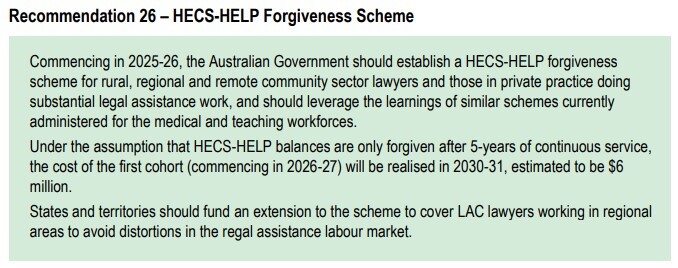Post-flood Lismore has fewer lawyers resulting in ongoing issues for clients
Lara Leahy
13 June 2024, 9:00 PM
 Sean Radburn, Tracey Randall, Brett McGrath and Jim Fuggle in front of the Lismore Court House
Sean Radburn, Tracey Randall, Brett McGrath and Jim Fuggle in front of the Lismore Court HouseThe number of private practice lawyers in the 2480 postcode has dropped 14.1% (74 down from 92) since the floods in 2022, and experienced practitioners has dropped 9.7% (121 down from 134).
The numbers may seem relatively small, but Jim Fuggle from James Fuggle Rummery Solicitors, reports that, “If I stopped taking on clients tomorrow, I would still be busy in 18 months.”
Tracy Randall from Randall Legal says she “has two full-time lawyers instead of 6.” She has stopped advertising for more, as no one is replying to the ads.
The Council of the Law Society, NSW, meets once a year in a remote location. This year, the conference is in Kingscliff, and two members, Brett McGrath, President of the Law Society of NSW, and Sean Radburn, the President of the Far North Coast Regional Law Society, were in Lismore today to unveil a proposal to attract lawyers to the region.
The Law Society of NSW said that last month's report of the Independent Review of the National Legal Assistance Partnership recommended that debt incurred under HELP (and forerunner HECS) be forgiven for;
- Private lawyers who can show that 45% of their work over a 5-year period was funded by Legal Aid, and;
- Regional lawyers who work for five years with non-government legal assistance providers.
Forgiven is a term used to indicate a discounted figure, but that would be determined by the government. The wording indicates that this would also be desirable for those who are still studying and paying off debt.

(Recommendation 26 is part of the independent report and how it aims to assist regional areas)
The Law Council of Australia (LCA) has produced a blueprint as to how the recommendations can be implemented.
Mr McGrath said, “Law is the most expensive degree eligible for HELP. Recent students are likely to amass around $70,000 in debt, including for the post-graduate courses necessary for them to qualify for admission to legal practice.”
Mr Bradburn adds, “As Lismore practices continue the long process of rebuilding after the floods, this is the sort of incentive that could attract early career lawyers from the city.
“Lawyers in the country are generally exposed to a much broader range of legal work than can usually be found in big city firms. Those just starting out in their careers can also gain valuable client-facing and court work for which they may otherwise have to wait for years to experience.”
Lismore is not alone as a regional area suffering from a lack of representation. Brett McGrath says, “The Law Council of Australia, which is the federal body, has led the charge for calling on the Commonwealth Government to institute hex fee help relief for all regional and rural practitioners.”
The lack of lawyers in the community can have detrimental effects on individuals. Mr McGrath explained, “When people come before the court, and they don't have legal representation, they are more likely to get worse outcomes, which means they may be bail refused, they may then be on remand for crimes.
“What that also means is that you have victims who are waiting for an outcome with court delays. So, having access to solicitors who can speak with prosecutors and work together in the justice system to get better outcomes. It's better outcomes, not only for defendants but also for the victims of crime who want to see justice done.”

Lismore and other surrounding communities are concerned about the increase in crime. Mr McGrath said, “When you have an uptick in crime in a region, it puts pressure on all services and service providers and we see solicitors as being a frontline service in the administration of justice.
“That volume of matters coming through puts strain on legal aid, and they're often the most vulnerable communities that are affected by an uptick in crime. And so you have victims waiting, but then you have defendants who may not have been before the court.
“Someone may be sitting in court today without a solicitor, and one of the first questions a magistrate will ask is, have you sought legal advice? and if they don't, they may be putting an incorrect plea in and it's really difficult to recover.
“And that then means that they may get a record when they wouldn't have had one beforehand, or they might not be put into a treatment program that they may have got advice from a solicitor to enter into. So it's creating perverse outcomes by not having solicitors and not having that access to justice in the regions.”
The exacerbated attrition of lawyers in the area has been seen due to flood-affected lawyers either moving away or retiring instead of rebuilding their business after the flood.

